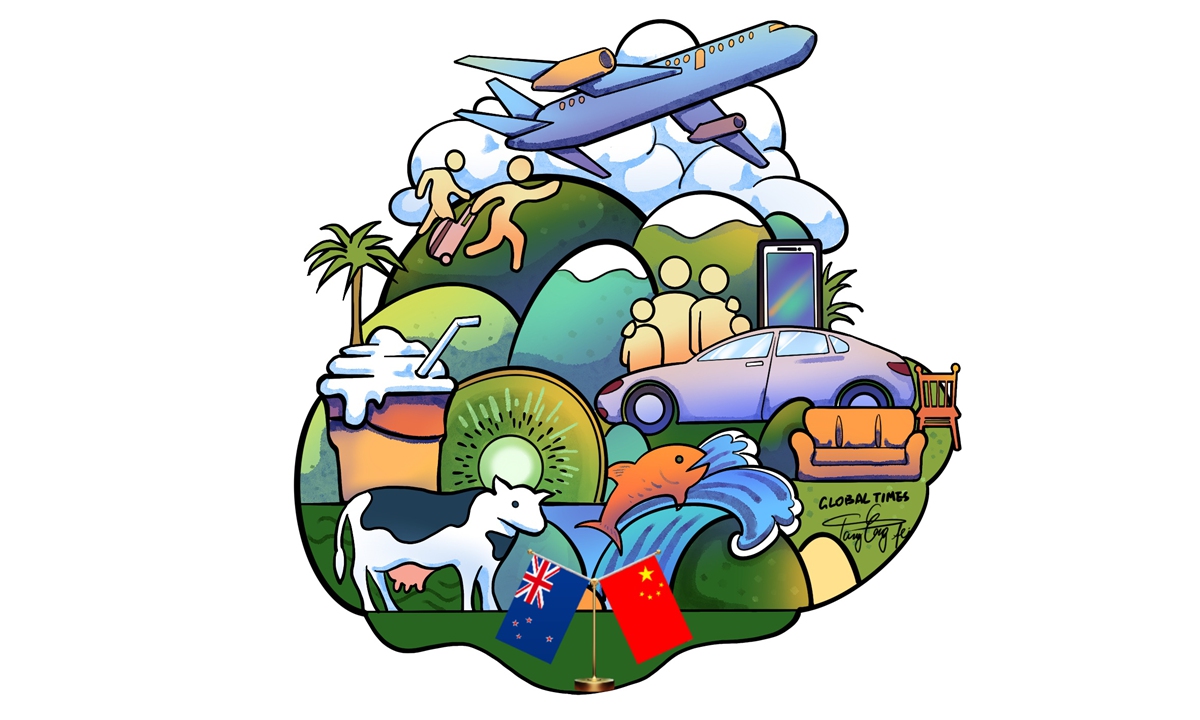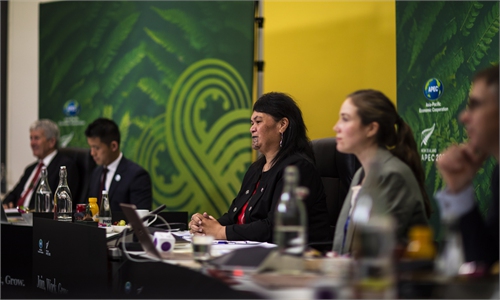
Illustration: Tang Tengfei/GT
As the US is busy trying to coerce its allies to decouple from the Chinese economy, China and New Zealand, which enjoy mutually beneficial economic and trade relations, as well as boundless cooperation potential, should be vigilant and jointly resist US hype surrounding the "decoupling from China" theory.An interesting phenomenon is that at a time when New Zealand Foreign Minister Nanaia Mahuta is paying a visit to China from Wednesday to Saturday, in what the New Zealand's new Prime Minister Chris Hipkins described as the country's "first significant in-person ministerial visit since the global pandemic," some Western media outlets have made an issue of New Zealand's trade diversification efforts. Bloomberg reported on Tuesday that asked if he saw value in diversifying trade beyond China, Hipkins said "absolutely," and "any trading nation, as New Zealand is, is wise to make sure that we've got a diverse network of trading relationships." Bloomberg interpreted his remarks as Hipkins urging his nation's exporters to reduce reliance on China.
There is no need to fall into Western media's narrative trap. In this increasingly globalized era, no bilateral economic relationship is exclusive. It's natural that New Zealand would seek to diversify its trade relationships, but we cannot say better relations between New Zealand and countries beyond China mean China is losing ground. Trade between China and New Zealand has continued to grow. Bilateral trade reached a new high of $25.15 billion in the year of 2022, up 1.8 percent year-on-year despite pandemic-induced disruptions.
Currently, the US is encouraging Western countries to reduce their economic dependence on those deemed as being against the so-called Western values, including China and Russia, or in other words, to select future partners for economic cooperation based on ideology. Washington's decoupling push is fundamentally different from normal trade diversification efforts, and will undoubtedly destabilize global industrial and supply chains as well as the international trade order.
With the US and its allies intensifying efforts to hype "China threat," New Zealand is also facing increasing pressure from Washington as the US ramps up its efforts in pushing the "decoupling from China" theory to pull more countries in to contain China. Amid increasing global economic uncertainty, New Zealand's politicians should maintain strategic sobriety. It should be pointed out that cooperation between China and New Zealand has great potential and broad development prospects. To exploit the economic complementarity, New Zealand should avoid being kidnapped by the US' "decoupling" push.
Some Chinese observers believe Mahuta's China visit is indicative of the fact that New Zealand has attached importance to China relations. China is now New Zealand's largest trading partner in goods and second largest overall including trade in services. The Chinese embassy in New Zealand said in November 2022 that China has accounted for 62.5 percent of New Zealand's export growth over the past decade, with the past five years seeing it rise to over 70 percent.
As the world economy starts to rebuild after the devastation of COVID-19, there is little doubt that China's economic recovery will help spur the global economy. Its sizeable and growing middle class offers significant opportunities for exporters from countries including New Zealand. Further facilitating trade with China is in New Zealand's economic interests, as the country is facing pressure from high inflation and rising interest rates. The two sides share cooperation potential in fields including goods and services trade, digital economy and green economy.
The key to economic growth is mutually beneficial trade cooperation, inclusiveness and open globalism, not exclusions, zero-sum divisions or even confrontation. In recent years, unlike some US allies that have served as anti-China spearheads, New Zealand relatively has acted with restraint and tried to stick to an independent foreign policy. The two countries have a high degree of economic complementarity, from any perspective, "decoupling" from the Chinese economy runs counter to New Zealand's economic interests.
However, just like every other bilateral relationship, the complex, multifaceted China-New Zealand engagement is by no means free of dispute or friction. Hipkins was quoted by media reports as saying in February that China is an incredibly important partner for New Zealand, but "that doesn't mean there aren't going to be areas where we disagree from time to time."
Nonetheless New Zealand may want to avoid unnecessary entanglement with China over trade issues and not let specific differences affect the overall situation of friendly economic ties with China if the country wishes to maintain the good momentum for economic cooperation. We believe New Zealand has the wisdom to make the best choice for itself.
The author is a reporter with the Global Times. bizopinion@globaltimes.com.cn



